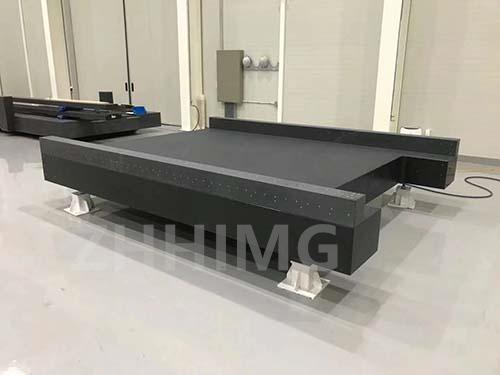In the field of quantum computing, which explores the mysteries of the microscopic world, any slight interference in the experimental environment can lead to a huge deviation in the calculation results. The granite base, with its outstanding performance, has become an indispensable key component in quantum computing laboratories, fundamentally ensuring the accuracy and stability of experiments.
Ultimate Stability: An impregnable Wall against External Disturbances
Quantum computing relies on the fragile quantum states of qubits, and external vibrations, temperature changes, or even fluctuations in electromagnetic fields can all cause the collapse of quantum states, rendering the calculation results invalid. Granite, as a natural dense stone, has an extremely low coefficient of thermal expansion, only (4-8) ×10⁻⁶/℃. When the laboratory environment temperature fluctuates, its size hardly changes, providing a stable support foundation for quantum computing equipment. Meanwhile, the unique internal crystal structure of granite endows it with excellent damping performance, with a damping ratio as high as 0.05-0.1. It can attenuate over 90% of the vibration energy transmitted from the outside within 0.3 seconds, effectively isolating the vibration interference generated by the operation of equipment and personnel movement around the laboratory, ensuring that the qubits maintain their quantum state in a stable environment.

Precision reference: The "Anchor" Ensuring Measurement Accuracy
In quantum computing experiments, the precise measurement of the state of qubits is the key to obtaining effective computing results. The granite base has undergone ultra-precision processing, with flatness controllable within ±0.1μm/m and surface roughness Ra≤0.02μm. It provides an almost perfect installation reference for high-precision sensors, laser interferometers and other measuring instruments in quantum computing devices. This high-precision reference plane can ensure that the relative positions between instruments remain accurate at all times, avoiding measurement errors caused by uneven or deformed bases, thereby enhancing the accuracy and reliability of quantum computing experimental data.
Insulation and anti-magnetic: The "Safety barrier" safeguarding quantum states
Qubits are highly susceptible to interference from electromagnetic fields, and traditional metal bases may generate electromagnetic induction or static electricity phenomena, affecting the stability of quantum computing. Granite is a non-metallic material with natural insulation and anti-magnetism properties. It does not interact with the surrounding electromagnetic fields, nor does it generate static electricity to attract dust or interfere with the operation of equipment. This feature creates a pure electromagnetic environment for quantum computing devices, enabling qubits to perform operations without interference and effectively reducing the error rate of calculations.
Durable and reliable: The "solid backing" for long-term stable operation
Quantum computing experiments often require continuous operation for long periods of time, and the durability requirements for the support base of the experimental equipment are extremely high. Granite has high hardness and strong wear resistance, with a Mohs hardness of 6 to 7. Under the long-term load of quantum computing equipment and frequent equipment debugging operations, it is not prone to wear and deformation. Meanwhile, it has stable chemical properties, is resistant to acid and alkali corrosion, can adapt to various chemical reagent environments in the laboratory, and has a service life of several decades, providing long-term stable and reliable support and guarantee for quantum computing laboratories.
In the cutting-edge technology field of quantum computing, granite bases, with their characteristics of stability, precision, insulation and durability, have become the core elements for building high-precision experimental environments. With the continuous development of quantum computing technology, the granite base will continue to play an irreplaceable and important role in promoting the research and application of quantum computing.
Post time: May-24-2025
